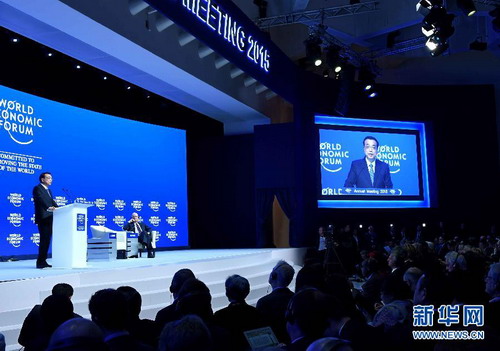
In the afternoon of January 21 local time, Premier Li Keqiang attended the World Economic Forum Annual Meeting 2015 in Davos, Switzerland and delivered a special speech entitled "Uphold Peace and Stability, Advance Structural Reform and Generate New Momentum for Development".
Li Keqiang noted that the current world, brimming with uncertainties and hopes, requires us to discuss the new approaches to cope with the new global situation. In a world facing complex international situation, China will work together to uphold peace and stability. Effective and generally recognized international orders and norms governing international relations must be maintained, not overturned. Otherwise, prosperity and development could be jeopardized. In a world of diverse civilizations, China will seek to live in harmony. Different cultures, religions and peoples need to respect and live in harmony with each other through inclusive cooperation and mutual learning. In a world facing volatile economic situation, China will work to promote opening-up and innovation. While each nation adopts economic policies in line with its national conditions, it needs to strengthen macro-policy coordination with the international community, resolutely reject protectionism together, and actively expand regional economic cooperation. The international community should make efforts to go ahead with structural reform, foster conditions conducive to global innovation, build global value chains, seize the opportunity of a new technological revolution and bring about new momentum for global development.
Li Keqiang said that the Chinese economy has entered a state of new normal. The gear of growth is shifting from high speed to medium-to-high speed, which reflects both profound adjustments in the world economy as well as the law of economics. In the face of economic downward pressure in 2014, China did not resort to strong stimulus; instead, it vigorously pursued reforms and kept the economy operating within the reasonable range. China should withstand economic downward pressure in 2015, maintain strategic focus and continue to pursue a proactive fiscal policy and a prudent monetary policy. China will also put more emphasis on anticipatory adjustment and fine-tuning, and do an even better job with targeted macro-regulation to stabilize economic growth, and raise the quality and performance of the economy. China is taking a series of measures to effectively fend off debt, financial and other potential risks. The Chinese economy will not head for a hard landing.

Li Keqiang pointed out that to ensure its economy to maintain medium-to-high speed of growth and achieve medium-to-high level of development, China needs to say "no" to traditional mindset and encourage innovative institutions. It needs to make efforts to press ahead with structural reform, adopt more innovative macro-regulation policies, optimize industry structure, expand domestic demands, increase consumption and optimize income distribution and raise the people's welfare. China's huge potential for development will create more development opportunities for the world.
Li Keqiang stressed that for the Chinese economy to maintain medium-to-high speed of growth and achieve medium-to-high level of development, it has to properly use both the hand of the government and the hand of the market, and rely on both the traditional and new engines of growth. The first is to foster a new engine of growth, encourage mass entrepreneurship and innovation, unleash people's ingenuity and power, bring greater welfare to the people, give people the stage to reach life's full potential, and bring about greater social mobility, equity and justice. The second is to transform the traditional engine of growth by focusing on increasing the supply of public goods and services. To the weak link, the government needs to increase financial investment, enhance the reforms of the investment, financing and pricing systems, actively encourage the participation of all sectors, deepen reforms of fiscal, taxation and financial systems, boost market regulation and create a fair competition environment.
Li Keqiang expressed that China will promote liberalization and facilitation of trade and investment, further expand the opening-up of service industry, central and western provinces, and capital market, vigorously advance the construction of the Silk Road Economic Belt and the 21st Century Maritime Silk Road, encourage Chinese enterprises to "go global", and achieve common development in the openness process among all countries. China will comprehensively deepen reforms, focus on structural reform, and use the twin engines to ensure that the economy maintains medium-to-high speed of growth and achieves medium-to-high level of development The international community should forge ahead to uphold peace and stability, embrace the principle of openness and inclusiveness, boost the impetus for reform and innovation and join efforts to usher into a brighter future.
Executive Chairman of the World Economic Forum (WEF) Klaus Schwab chaired the plenary session. Over 2000 people, including heads of nations and international organizations such as President Simonetta Sommaruga of the Swiss Confederation, King Philippe of Belgium and his wife, Prime Minister Aleksandar Vucic of Serbia, Managing Director Christine Lagarde of the International Monetary Fund (IMF), President Jim Yong Kim of World Bank and President Peter Maurer of International Committee of the Red Cross (ICRC) as well as representatives from political, business, academic and all other fields, were present at the session.
